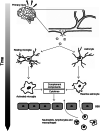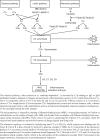Tackling Neuroinflammation After Traumatic Brain Injury: Complement Inhibition as a Therapy for Secondary Injury
- PMID: 36222978
- PMCID: PMC10119357
- DOI: 10.1007/s13311-022-01306-8
Tackling Neuroinflammation After Traumatic Brain Injury: Complement Inhibition as a Therapy for Secondary Injury
Abstract
Traumatic brain injury (TBI) is a leading cause of mortality, sensorimotor morbidity, and neurocognitive disability. Neuroinflammation is one of the key drivers causing secondary brain injury after TBI. Therefore, attenuation of the inflammatory response is a potential therapeutic goal. This review summarizes the most important neuroinflammatory pathophysiology resulting from TBI and the clinical trials performed to attenuate neuroinflammation. Studies show that non-selective attenuation of the inflammatory response, in the early phase after TBI, might be detrimental and that there is a gap in the literature regarding pharmacological trials targeting specific pathways. The complement system and its crosstalk with the coagulation system play an important role in the pathophysiology of secondary brain injury after TBI. Therefore, regaining control over the complement cascades by inhibiting overshooting activation might constitute useful therapy. Activation of the complement cascade is an early component of neuroinflammation, making it a potential target to mitigate neuroinflammation in TBI. Therefore, we have described pathophysiological aspects of complement inhibition and summarized animal studies targeting the complement system in TBI. We also present the first clinical trial aimed at inhibition of complement activation in the early days after brain injury to reduce the risk of morbidity and mortality following severe TBI.
Keywords: Complement system; Inhibition; Narrative review; Neuroinflammation; Traumatic brain injury.
© 2022. The Author(s).
Conflict of interest statement
FB is founder of Complement Pharma BV, and KF is paid consultant for Complement Pharma BV. All other authors declare no competing interests.
Figures
References
-
- Hanrahan F, Campbell M. Neuroinflammation. In: Laskowitz D, Grant G, editors. Translational research in traumatic brain injury. Boca Raton (FL): CRC Press/Taylor and Francis Group; 2016. Chapter 6. Available from: https://www.ncbi.nlm.nih.gov/books/NBK326720/. - PubMed
Publication types
MeSH terms
LinkOut - more resources
Full Text Sources
Medical
Miscellaneous



